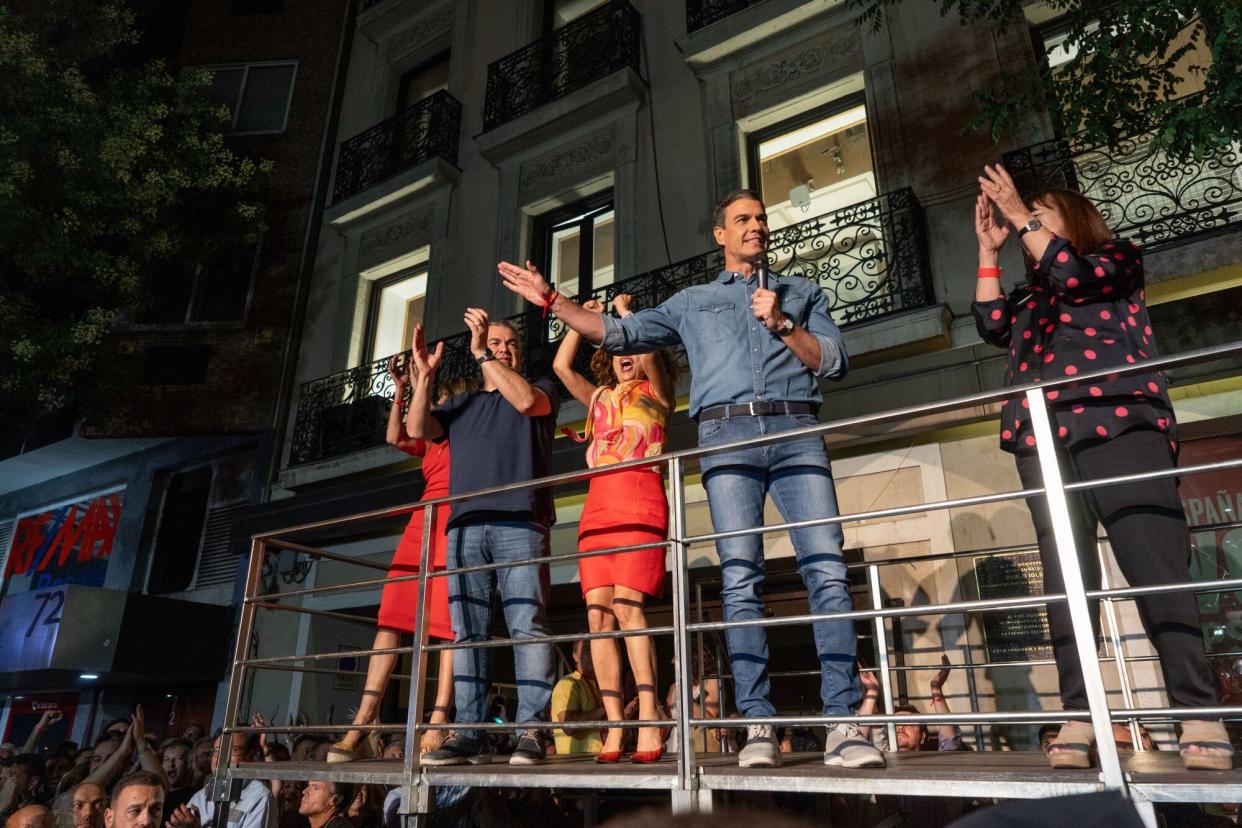Late Sanchez Surge Leaves Spain Facing Political Gridlock Again

- Oops!Something went wrong.Please try again later.
- Oops!Something went wrong.Please try again later.
(Bloomberg) -- A late swing toward Prime Minister Pedro Sanchez’s Socialists denied his right-wing opponents a majority in parliament but leaves Spain facing months of instability without a fully functioning government.
Most Read from Bloomberg
The Bear Market Has Nearly Been Erased, Fewer Than 20 Months After It Began
US Recession Becomes Closer Call as Economists Rethink Forecasts
Oil Trader Vitol Doubled Average Pay on Record $15.1 Billion Profit
While the center-right People’s Party won the most seats, the right-wing bloc has only 170 in total and needed 176 to oust the 51-year-old Socialist. With a wider range of potential partners, Sanchez could potentially muster 172 votes. To secure a third term though, he’d need help from a Catalan separatist party with whom he’s had a tricky relationship.
Sanchez and PP leader Alberto Nunez Feijoo both claimed victory but it may well require a repeat election later this year before either can take office.
Spain’s benchmark stock index fell more than 1% as investors digested the results and the prospect of prolonged deadlock. The reaction in the bond market was more muted, with Spanish bonds rising in line with peers Monday after another round of weak economic data in Europe.
“With no clear majority, government initiatives are likely to remain paralyzed, which could detract from confidence and dent investment into Spain and weigh on Spanish bonds,” said Evelyne Gomez-Liechti, rates strategist at Mizuho International.
Spain has become accustomed to periods of political gridlock since the breakdown of the traditional two party system a decade ago. That has left party leaders struggling to piece together support in a fragmented parliament and led to a succession of weak minority governments.
Read more: Spanish Pollsters Underestimated Catalan Fears of Hard Right
Sanchez has proved to be a master of navigating this unfamiliar territory, repeatedly pulling together alliances that combine the far-left as well as separatist groups from Catalonia and the Basque region. While those parties have widely differing objectives and demands, Sanchez was able to strike compromises by appealing to their common opposition to the conservative PP and that maneuver has become more compelling since the emergence of the far-right group Vox.
To squeak through in a vote of confidence this time, Sanchez would need to persuade Junts per Catalunya, a separatist party with seven lawmakers, to abstain. That’s not going to be easy since Junts officials feel they were betrayed by Sanchez after May’s local elections when he forged an alliance with the PP to prevent their candidate becoming mayor of Barcelona.
Miriam Nogueras, a lawmaker for Junts, said late Sunday that the party will demand the return of exiled Carles Puigdemont, the former president of Catalonia who has been living in Belgium since the failed attempt to break away from Spain in 2017. The group will also ask for a referendum on independence, she said.
“We will not make Sanchez premier in exchange for nothing,” she said.
For the time being, Sanchez will remain as caretaker prime minister but many analysts are suggesting that he will eventually have to call another election. That’s what happened in 2019, when a seven-month limbo period of failed coalition efforts was eventually settled by a second vote.
A similarly inconclusive results in the 2016 election triggered an internal crisis in the Socialist party before the PP’s Mariano Rajoy was installed at the head of a minority government. Rajoy lasted another two years before he was toppled during the fallout from the Catalan crisis.
Feijoo had looked set for a clear victory when a polling blackout began on Tuesday, with the final surveys suggesting the right-wing bloc would win as many as 180 seats. To turn the situation around, Sanchez embarked on a media blitz to get the Socialist vote out.
The prime minister gave a string of interviews, including with journalists he had avoided for years for considering them too critical. Former Socialist Prime Minister Jose Luis Rodriguez Zapatero did days of rallies and interviews, urging supporters to stop the right wing bloc from winning.
That strategy delivered strong showings in Catalonia and Andalusia, traditional strongholds for his party, where support had fallen in recent years. On Sunday, the Socialists won 24 seats for Andalusia against the PP’s 23. In Catalonia, the Socialists were the most voted party and won 19 seats against six for the PP.
“Sanchez, ever the political survivor, lives to fight another day,” Federico Santi, an analyst at Eurasia Group, said in an interview. “Neither the right nor the left have a clear path to a majority. Currently, the most logical conclusion seems to be repeat elections.”
--With assistance from Macarena Muñoz, Matthew Burgess, Alice Gledhill and Dayana Mustak.
Most Read from Bloomberg Businessweek
No Testing, No Inspections: Contaminated Eyedrops Blinded and Killed Americans
This Supposed Mafia Manifesto Doesn’t Stand Up to a Google Search
Hot New Play in Stock, Bond Markets: Greece Is Suddenly Booming
©2023 Bloomberg L.P.


